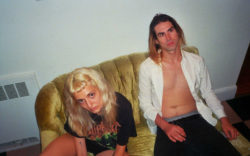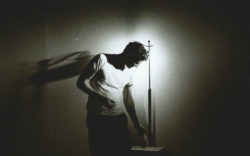The Spectacular Now, which opens today in L.A. and New York, is not Athens native James Ponsoldt’s first feature-length film (it’s his third, following 2006’s Off the Black and last year’s Smashed) but it’s by far his most personal. Set in Ponsoldt’s hometown, and shot here last summer, the movie documents a budding high-school relationship. But it’s no breezy teen rom-com, having already earned rave reviews from outlets like The New Yorker.
Ponsoldt admits to an intense autobiographical connection with the story, and tells Flagpole that shooting in Athens was “a dream that I’d had since I was a teenager.” Read the rest of our conversation with the director, who will host two screenings of The Spectacular Now at Ciné on Tuesday, Aug. 6, below.
Flagpole: Congratulations on all the great feedback the film is getting so far. Has that surprised you at all?
James Ponsoldt: When you’re making a film, you get so caught up in the process of it, I think you lose all sense of objective reality. You don’t really have any idea, what you’re obsessing over, how other people will respond to it. I think the most mentally healthy thing is to not obsess over things you can’t control. I think you do have a feeling in your gut, if you think the movie works, at a certain point. But none of us had any idea the reception would be so warm and positive.
Much of the critical excitement seems to stem from the fact that it’s a more realistic portrayal of teenage life than most films. Was this a conscious decision?
I always approach a story from the characters’ [perspective]—really trying to understand who the characters are, their history with their family, their socioeconomic reality. All those factors that create character are the things that I start with before I get really interested in story. I’m only interested in very real characters, who show nuance and have complications and contradictions, the way real people do. So, I would use that approach in a story where the characters were six, or 18, or 75.
For me, a film with teenagers doesn’t have to be a “teen movie.” At a certain point, the Hollywood studio system decided that movies about teenagers had to be immature, with T&A jokes, or about kids with superpowers, or whatever [laughs]. That’s not really my thing. Or, it is—teens with superpowers are fun. But I think it’s better when you actually care about the people.
What was it specifically that drew you to Tim Tharpe’s book? Also, were there any other coming-of-age books or films that you leaned on while making The Spectacular Now?
What really drew me to the material was, it was one of the most honest depictions of adolescent life I’d ever read in my life. It reminded me a lot of my own adolescence, growing up in Athens. Sutter, the main character, and some of the secondary characters, reminded me of myself at that point of my life, and some of the people I knew. It resonated with me on a very personal level. Every film I make, I want to make it as hyper-personal and specific as possible. It was really important to me to bring it to Athens and shoot at a lot of the places where I’d grown up.
As far as the second part, I never really approached it [as a] coming-of-age [film], or a teen love story. There’s just a point of view that a storyteller can have, or not have, where you [give] the characters a sense of emotional complexity and a mysterious inner life. Or you can do really flat and two-dimensional, which always sucks, whether they’re adults or teenagers. So, a lot of the movies that were meaningful to me were about adults and teenagers. I really love Last Picture Show, I really love Splendor in the Grass, I really love 400 Blows. I really love Say Anything, but I also really love Manhattan, and A Woman Under the Influence and Minnie and Moskowitz, which are two John Cassavettes movies. Punch-Drunk Love. There were a lot of films that were frames of reference.
Your last two films have explored the subject of alcoholism, but through different lenses. Was that an accident, or was there something that drew you to that theme?
Smashed was something I wrote over the course of a couple years with a very good friend. It dealt overtly—obviously, it was a love story about two people in their late 20s who are both high-functioning alcoholics. [But] the main character is only drunk for the first 20 minutes of the movie, and after that she gets sober and the story more becomes about, when a couple is codependent and something changes, how it can sort of destabilize the relationship. That was really born out of me having gone to my third or fourth wedding where the bride and groom were drunk at their own wedding [laughs]. It was funny, but then you can sort of project ahead a couple years to when they have kids and then it suddenly becomes very tragic.
In the case of The Spectacular Now, I never really thought of the movie as being about alcoholism. Some people have written about it, and thought about it as such, but it’s not that. It’s a portrait of a complicated young man, and it’s a love story about two complicated people. The kid drinks, but he drinks a hell of a lot less than most of the people I grew up with in Athens. I think it’s part of who Sutter is. The story never names it as alcoholism, never comments on it, never judges it. I think some people project that on it—and I think our understanding of the character shifts a bit as you get to know him.
Tell me a little bit about the experience of filming in Athens, on a personal level and on a wider scale.
Shooting a movie in Athens was a dream that I’d had since I was a teenager. With The Spectacular Now, the story seemed so perfect for Athens. I worked hard to sort of sell the people around me on the idea of going to Athens. Athens is where I was born, it’s where I was raised, it’s where my parents still live. In every nook and cranny of Athens, I have some memory. My dad taught at the University for over 30 years, so I grew up in and around the UGA campus.
It really is a film that showcases Athens on a very local level, and not a very touristy way. Every now and then, people come through and do something about music in Athens, and they show the R.E.M. steeple, or they show the railroad trestle, or the arch. But that wasn’t what I was interested in. The main characters are still in high school—they’re not 21, they don’t have fake IDs yet. More importantly, it’s not that they proactively decided to move to Athens because of the music scene, or for college. They just happened to grow up there. In some people’s eyes, you might call them townies. So there’s a proximity—they have the awareness of all those kids that are a few years older, but they don’t get to take part in all the crazy freeness of being in college. And that was kind of my experience growing up in Athens.
The first phone call I made when I knew I wanted to direct this movie was to Danielle Robarge, who’s the head of Film Athens. I called and said, “Hey, it looks like this coming summer, I really wanna try to take this movie down there. How can we do this?” She really laid the groundwork, because I wasn’t in Athens at the time. She could take photos [of locations] and send them to me, and I could share them with people in Los Angeles, and really give them the sense of how Athens is so unique.
Our production office was downtown, in R.E.M.’s former office, which they had vacated the fall before. And it was very surreal, because growing up in Athens in the ’80s and ’90s, R.E.M. were the patron saints of everything cool. It meant a lot to me—emotionally, psychically, spiritually, in every single way. On a very practical level, I was getting to commit [Athens] to film, but I was also getting to give jobs and opportunities to Athens.
A lot of the people on the film fell in love with Athens. It was really awesome to have people I knew from Los Angeles and New York talking about the Manhattan, talking about the Globe. It was really cool for me. And Ciné was so profoundly helpful in every way. Ciné let us have local auditions there, they let me and my cinematographer screen movies there before we started shooting, as frames of reference. People were so laid-back and supportive and so nice.
I noticed, in a scene from the trailer, the actor who plays Sutter, Miles Teller, is wearing a Transmetropolitan T-shirt. Are there any other Athens easter eggs local audiences can look for at the Ciné screenings on Tuesday?
Yeah, but I don’t wanna give too much away [laughs]. I think about a movie like Breaking Away, which was shot in Bloomington, IN, and dealt with the cutters and the college kids. I think that’s so great, and it transcends, because it’s not very obviously about Indiana University. It deals with that town on a specific level—which is to say, yes, people who are from Athens and see the movie will see tons of stuff they know. It’s on a very local level. It’s from the point of view of someone who’s growing up in Athens, and not as someone who’s a tourist.
For me [laughs], the biggest existential crisis was a lot of the story takes place in a high school, and we wound up shooting at Clarke Central. Which was a great place to shoot, but I went to Cedar Shoals, and Clarke Central was our rival. I had to sort of swallow that.
Like what you just read? Support Flagpole by making a donation today. Every dollar you give helps fund our ongoing mission to provide Athens with quality, independent journalism.










